
PALIPERIDONA STADA 100 mg SUSPENSÃO INJETÁVEL DE LIBERTAÇÃO PROLONGADA EM SERINGA PREENCHIDA
Pergunte a um médico sobre a prescrição de PALIPERIDONA STADA 100 mg SUSPENSÃO INJETÁVEL DE LIBERTAÇÃO PROLONGADA EM SERINGA PREENCHIDA

Como usar PALIPERIDONA STADA 100 mg SUSPENSÃO INJETÁVEL DE LIBERTAÇÃO PROLONGADA EM SERINGA PREENCHIDA
Introdução
Prospecto: informação para o utilizador
Paliperidona Stada 50 mg suspensão injetável de libertação prolongada
em seringa pré-carregadaEFG
Paliperidona Stada 75 mg suspensão injetável de libertação prolongada
em seringa pré-carregadaEFG
Paliperidona Stada 100 mg suspensão injetável de libertação prolongada
em seringa pré-carregadaEFG
Paliperidona Stada 150 mg suspensão injetável de libertação prolongada
em seringa pré-carregadaEFG
Leia todo o prospecto atentamente antes de começar a usar este medicamento, porque contém informações importantes para si.
- Conserva este prospecto, porque pode ter que voltar a lê-lo.
- Se tiver alguma dúvida, consulte o seu médico, farmacêutico ou enfermeiro.
- Este medicamento foi prescrito apenas para si, e não deve dá-lo a outras pessoas, mesmo que tenham os mesmos sintomas que si, porque pode prejudicá-las.
- Se experimentar efeitos adversos, consulte o seu médico, farmacêutico ou enfermeiro, mesmo que se trate de efeitos adversos que não aparecem neste prospecto. Ver secção 4.
Conteúdo do prospecto
- O que é Paliperidona Stada e para que é utilizado
- O que precisa saber antes de começar a usar Paliperidona Stada
- Como usar Paliperidona Stada
- Possíveis efeitos adversos
- Conservação de Paliperidona Stada
- Conteúdo do envase e informação adicional
1. O que é Paliperidona Stada e para que é utilizado
Paliperidona Stada contém o princípio ativo paliperidona que pertence à classe de medicamentos antipsicóticos e é utilizado como tratamento de manutenção para os sintomas de esquizofrenia em pacientes adultos estabilizados com paliperidona ou risperidona.
Se si mostrou resposta a paliperidona ou risperidona no passado e tem sintomas leves ou moderados, o seu médico pode iniciar o tratamento com paliperidona sem uma estabilização prévia com paliperidona ou risperidona.
A esquizofrenia é um transtorno com sintomas "positivos" e "negativos". Positivo significa um excesso de sintomas que normalmente não estão presentes. Por exemplo, uma pessoa com esquizofrenia pode ouvir vozes ou ver coisas que não existem (denominadas alucinações), ter crenças erróneas (denominadas delírios) ou ter uma desconfiança nos outros fora do normal. Negativo se refere à falta de comportamentos ou sentimentos que normalmente estão presentes. Por exemplo, uma pessoa com esquizofrenia pode fechar-se em si mesma e não responder a nenhum estímulo emocional ou podem ter problemas para falar de uma maneira clara e lógica. As pessoas que sofrem deste transtorno também podem sentir-se deprimidas, ansiosas, culpadas ou tensas.
Paliperidona pode ajudar a aliviar os sintomas da sua doença e evitar que reapareçam.
2. O que precisa saber antes de começar a usar Paliperidona Stada
Não use Paliperidona Stada
- se é alérgico a paliperidona ou a algum dos outros componentes deste medicamento (incluídos na secção 6)
- se é alérgico a qualquer outro medicamento antipsicótico, incluindo a risperidona.
Advertências e precauções
Consulte o seu médico, farmacêutico ou enfermeiro antes de começar a usar paliperidona.
Este medicamento não foi estudado em pacientes de idade avançada com demência. No entanto, os pacientes de idade avançada com demência que estão sendo tratados com outros medicamentos semelhantes, podem ver aumentado o risco de derrame cerebral ou morte (ver secção 4, Possíveis efeitos adversos).
Todos os medicamentos têm efeitos secundários e alguns dos efeitos secundários deste medicamento podem piorar os sintomas de outras patologias. Por essa razão, é importante que comente com o seu médico qualquer uma das seguintes doenças, que poderiam piorar durante o tratamento com este medicamento:
- se tem a doença de Parkinson
- se alguma vez foi diagnosticado com uma doença cujos sintomas incluem temperatura elevada e rigidez muscular (também conhecida como Síndrome Neuroléptico Maligno)
- se alguma vez experimentou movimentos anómalos da língua ou face (Discinesia Tardia)
- se teve no passado níveis baixos de células brancas do sangue (que pode ou não ter sido causado por outros medicamentos)
- se é diabético ou tem tendência para a diabetes
- se teve cancro de mama ou um tumor na hipófise do cérebro
- se padece alguma doença cardíaca ou se recebe tratamento para doenças cardíacas que podem torná-lo mais propenso a uma redução da tensão arterial
- se tem a tensão arterial baixa quando se põe de pé ou se incorpora de forma repentina
- se padece epilepsia
- se tem problemas de rim
- se tem problemas de fígado
- se tem uma ereção prolongada e/ou dolorosa
- se tem dificuldades para o controlo da temperatura corporal ou está acalorado
- se tem um nível anormalmente alto da hormona prolactina no sangue ou se tem um tumor que possivelmente seja dependente da prolactina
- se si ou alguém na sua família tem antecedentes de coágulos sanguíneos, dado que os antipsicóticos se associaram com a formação de coágulos de sangue.
Se tiver alguma dessas doenças, por favor consulte com o seu médico, porque poderia ser necessário um ajuste da sua dose ou manter-lhe em observação durante um tempo.
- Devido a que em muito raras ocasiões se observou em pacientes tratados com este medicamento um número perigosamente baixo de um tipo de células brancas necessárias para combater as infecções no sangue, o seu médico pode comprovar o número de células brancas do sangue.
- Even se si tolerou previamente paliperidona oral ou risperidona, raramente ocorrem reações alérgicas após receber injeções de paliperidona. Solicite ajuda médica imediatamente se experimentar uma erupção cutânea, inchaço da garganta, picazão ou problemas de respiração, porque estes podem ser sinais de uma reação alérgica grave.
- Este medicamento pode fazer com que si ganhe peso. Um aumento de peso significativo pode afetar negativamente a sua saúde. O seu médico realizará regularmente um seguimento do seu peso.
- Em pacientes tratados com este medicamento se observou diabetes mellitus ou piora de diabetes mellitus pré-existente, o seu médico deve comprovar os sinais de um aumento de açúcar no sangue. Em pacientes com diabetes mellitus pré-existente se deve monitorizar regularmente o açúcar no sangue.
- Dado que este medicamento pode reduzir o impulso de vomitar, existe a possibilidade de que possa mascarar a resposta normal do organismo perante a ingestão de substâncias tóxicas ou outras patologias.
- Durante a intervenção no olho por turbidez das lentes (cataratas), a pupila (o círculo negro situado no meio do olho), pode não aumentar de tamanho como se necessita. Além disso, o íris (a parte colorida do olho) pode tornar-se flácido durante a cirurgia e isto pode causar dano no olho. Se si está a pensar em ser operado dos olhos, certifique-se de informar o seu oftalmologista de que está a usar este medicamento.
Crianças e adolescentes
Não utilize este medicamento em menores de 18 anos.
Outros medicamentos e Paliperidona Stada
Informa o seu médico se está a utilizar, utilizou recentemente ou pudesse ter que utilizar qualquer outro medicamento.
- A tomada deste medicamento juntamente com carbamazepina(um antiepiléptico e estabilizador do humor) pode requerer um cambio da sua dose deste medicamento.
- Dado que este medicamento actua principalmente no cérebro, a interacção com outros medicamentos que também actuem sobre ele pode causar uma exageração dos efeitos secundários, tais como sonolência ou outros efeitos sobre o cérebro tais como outros medicamentos psiquiátricos, opioides, antihistamínicose medicamentos para dormir.
- Dado que este medicamento pode reduzir a tensão arterial, deverá ter cuidado se usa este medicamento com outros medicamentos que reduzam a tensão arterial.
- Este medicamento pode reduzir o efeito dos medicamentos para a doença de Parkinson e o síndrome de pernas inquietas (p. ex., levodopa).
- Este medicamento pode causar uma anomalia no electrocardiograma (ECG) que põe de manifesto que é necessário um período prolongado para que um impulso eléctrico viaje através de uma certa parte do coração (conhecido como "prolongação do intervalo QT"). Outros medicamentos que têm este efeito incluem alguns medicamentos usados para tratar o ritmo cardíaco ou para tratar as infecçõese outros antipsicóticos.
- Se é propenso a desenvolver convulsões, é possível que este medicamento aumente as suas probabilidades de experimentá-las. Outros medicamentos que têm este efeito incluem alguns medicamentos usados para tratar a depressão ou para tratar as infecçõese outros antipsicóticos.
- Paliperidona deve ser usado com precaução com medicamentos que aumentam a actividade do sistema nervoso central (psicoestimulantes tais como metilfenidato).
Uso de Paliperidona Stada com álcool
Deve evitar o álcool.
Gravidez e amamentação
Se está grávida ou em período de amamentação, acredita que possa estar grávida ou tem intenção de ficar grávida, consulte o seu médico ou farmacêutico antes de utilizar este medicamento.
Gravidez
Não deve usar este medicamento durante a gravidez a menos que o tenha comentado com o seu médico. Podem produzir-se os seguintes sintomas em bebés recém-nascidos, de mães que foram tratadas com paliperidona no último trimestre de gravidez (últimos três meses da sua gravidez): tremores, rigidez e/ou fraqueza muscular, sonolência, agitação, problemas ao respirar e dificuldade na alimentação. Se o seu bebé desenvolve algum desses sintomas deve contactar o seu médico.
Amamentação
Este medicamento pode passar de mãe para filho pelo leite materno e pode prejudicar o bebé. Por conseguinte, não deve dar o peito enquanto estiver a usar este medicamento.
Condução e uso de máquinas
Durante o tratamento com este medicamento podem aparecer tonturas, cansaço extremo e problemas de visão (ver secção 4). Isto deve ser tido em conta quando se requer uma atenção máxima, p. ex., quando conduzir ou manejar máquinas.
Paliperidona Stada contém sódio
Este medicamento contém menos de 1 mmol de sódio (23 mg) por dose; isto é, essencialmente “isento de sódio”.
3. Como usar Paliperidona Stada
O seu médico ou outro profissional de saúde lhe administrará este medicamento. O seu médico lhe indicará quando se deve administrar a próxima injeção. É importante que não omita nenhuma das doses programadas. Se não puder comparecer à sua consulta com o médico, certifique-se de ligar-lhe de imediato para concertar outra consulta o mais breve possível.
Dose e forma de administração
Receberá a primeira injeção (150 mg) e a segunda injeção (100 mg) deste medicamento na parte superior do braço aproximadamente com uma semana de diferença. A partir daí, receberá uma injeção (de entre 25 mg e 150 mg) na parte superior do braço ou nas nádegas uma vez ao mês.
Se o seu médico lhe está a mudar de risperidona injetável de longa duração para este medicamento, receberá a primeira injeção deste medicamento (de entre 25 mg e 150 mg) na parte superior do braço ou nas nádegas na próxima injeção programada. A partir daí, receberá uma injeção (de entre 25 mg e 150 mg) na parte superior do braço ou nas nádegas uma vez ao mês.
Dependendo dos seus sintomas, o médico pode aumentar ou diminuir a quantidade de medicamento que recebe em um nível de dose no momento da injeção mensal programada.
Pacientes com problemas de rim
O seu médico pode ajustar a dose deste medicamento de acordo com a sua função renal. Se si tiver problemas leves de rim, o seu médico lhe pode dar uma dose menor. Não deve usar este medicamento se si tiver problemas de rim moderados ou graves.
Pacientes de idade avançada
O seu médico pode reduzir a dose deste medicamento se a função do seu rim estiver diminuída.
Se receber mais Paliperidona Stada do que deve
Receberá este medicamento sob supervisão médica; é, por tanto, pouco provável que receba uma dose excessiva.
Os pacientes que tenham recebido um excesso de paliperidona podem experimentar os seguintes sintomas: sonolência ou sedação, frequência cardíaca rápida, tensão arterial baixa, anomalias no electrocardiograma (traçado eléctrico do coração) ou movimentos lentos ou anómalos da face, do corpo, dos braços ou das pernas.
Em caso de sobredose ou ingestão acidental, contacte o seu médico ou ligue para o Serviço de Informação Toxicológica, telefone: 91 562 04 20, indicando o medicamento e a quantidade ingerida.
Se interromper o tratamento com Paliperidona Stada
Se deixar de receber as suas injeções, perder-se-ão os efeitos do medicamento. Não deve deixar de usar este medicamento a menos que o seu médico lhe indique, porque poderiam aparecer de novo os sintomas.
Se tiver alguma outra dúvida sobre o uso deste medicamento, pergunte ao seu médico ou farmacêutico.
4. Possíveis efeitos adversos
Tal como todos os medicamentos, este medicamento pode produzir efeitos adversos, embora nem todas as pessoas os sofram.
Informar imediatamente ao seu médico se:
- apresenta coágulos sanguíneos nas veias, especialmente nas pernas (os sintomas incluem inchaço, dor e vermelhidão da perna), que podem circular através dos vasos sanguíneos para os pulmões, causando dor no peito e dificuldade para respirar. Se você notar algum desses sintomas, peça conselho médico imediatamente.
- têm demência e apresenta uma mudança repentina do seu estado mental ou fraqueza repentina ou entorpecimento da face, braços ou pernas, especialmente de um dos lados, ou custa a falar, mesmo durante um período curto de tempo. Pode ser sinal de um derrame cerebral.
- apresenta febre, rigidez muscular, suor ou uma diminuição do nível de consciência (transtorno conhecido como “Síndrome Neuroléptico Maligno”). Pode necessitar de tratamento médico imediato.
- é homem e apresenta uma ereção prolongada ou dolorosa. Conhecido como priapismo. Pode necessitar de tratamento médico imediato.
- apresenta movimentos rítmicos involuntários da língua, boca e face. Pode ser necessário a retirada de paliperidona.
- apresenta uma reação alérgica grave caracterizada por febre, inchaço da boca, face, lábios ou língua, dificuldade respiratória, coceira, erupção cutânea e, algumas vezes, descenso da tensão arterial (reação anafiláctica). Mesmo que tenha tolerado previamente a risperidona oral ou a paliperidona oral, em raras ocasiões, reações alérgicas apareceram após a administração de injeções de paliperidona.
- tem previsto submeter-se a uma operação nos olhos, certifique-se de dizer ao seu oftalmologista que está tomando este medicamento. Durante uma operação nos olhos por opacidade das lentes (cataratas), é possível que a íris (a parte colorida do olho) fique flácida durante a cirurgia (o que se denomina “síndrome da íris flácida”), o que pode ocasionar dano no olho.
- apresenta um número perigosamente baixo de um tipo de células brancas do sangue necessárias para combater infecções sanguíneas.
Podem aparecer os seguintes efeitos adversos:
Muito frequentes:podem afetar mais de 1 em cada 10 pessoas
- dificuldade para ficar ou permanecer dormido.
Frequentes:podem afetar até 1 em cada 10 pessoas
- sintomas de resfriado comum, infecção do trato urinário, sentir como se tivesse gripe
- Paliperidona pode aumentar os níveis de uma hormona chamada “prolactina” que se detecta nos exames de sangue (o que pode ou não causar sintomas). Quando aparecem os sintomas do aumento da prolactina, podem incluir (em homens) inchaço dos seios, dificuldade em ter ou manter ereções ou outras disfunções sexuais; (em mulheres) mal-estar dos seios, secreção de leite pelos seios, perda de períodos menstruais ou outros problemas com o ciclo
- aumento do açúcar no sangue, aumento de peso, perda de peso, apetite diminuído
- irritabilidade, depressão, ansiedade
- parkinsonismo: esta doença pode incluir movimento lento ou alterado, sensação de rigidez ou tensão dos músculos (fazendo movimentos bruscos) e, algumas vezes, uma sensação de “congelamento” do movimento que depois se reinicia. Outros sinais do parkinsonismo incluem andar devagar arrastando os pés, tremor enquanto descansa, aumento da saliva e/ou baba e perda de expressividade da face
- inquietude, sentir-se sonolento ou menos atento
- distonia: é um transtorno que envolve contração involuntária lenta ou contínua dos músculos. Embora possa estar afetada qualquer parte do corpo (e pode originar posturas anormais), a distonia afeta com frequência os músculos da face, incluindo movimentos anormais dos olhos, boca, língua ou mandíbula
- tontura
- discinesia: este transtorno envolve movimentos musculares involuntários e pode incluir movimentos repetitivos, espasmódicos ou de torção, ou espasmos
- tremor (agitação)
- dor de cabeça
- batimento rápido do coração
- aumento da pressão arterial
- tosse, congestão nasal
- dor abdominal, vômitos, náuseas, constipação, diarreia, indigestão, dor de dentes
- aumento das transaminases do fígado no sangue
- dor de ossos ou músculos, dor de costas, dor das articulações
- ausência de menstruação
- febre, fraqueza, fadiga (cansação)
- uma reação no local da injeção, incluindo coceira, dor ou inchaço
Pouco frequentes:podem afetar até 1 em cada 100 pessoas
- pneumonia, infecção de peito (bronquite), infecção das vias respiratórias, infecção dos seios paranasais, infecção da bexiga, infecção de ouvidos, infecção das unhas por fungos, amigdalite, infecção da pele
- diminuição do número de células brancas do sangue, diminuição de um tipo de células brancas do sangue que ajudam a combater infecções, anemia
- reação alérgica
- diabetes ou piora do diabetes, aumento da insulina (uma hormona que controla os níveis de açúcar no sangue) no sangue
- aumento de apetite
- perda de apetite que causa má nutrição e diminuição do peso corporal
- aumento dos triglicerídeos no sangue (um tipo de gordura), aumento do colesterol no sangue
- transtorno do sono, euforia (mania), diminuição do desejo sexual, nervosismo, pesadelos
- discinesia tardia (espasmos ou movimentos espasmódicos que não se podem controlar na face, língua ou outras partes do corpo). Informe ao seu médico imediatamente se experimenta movimentos rítmicos involuntários da língua, boca ou face. Pode ser necessária a retirada deste medicamento.
- desmaio, uma inquietude que provoca o movimento de partes do corpo, tontura ao levantar, alteração da atenção, problemas com a fala, perda ou alterações do gosto, diminuição da sensibilidade da pele ao dor ou ao toque, sensação de formigamento, picadas ou entorpecimento da pele
- visão borrada, infecção de olhos ou “olho rosa”, secura dos olhos
- sensação de que tudo gira (vertigem), zumbido nos ouvidos, dor de ouvidos
- interrupção da condução entre as partes superiores e inferiores do coração, anomalia na atividade elétrica do coração, prolongamento do intervalo QT no coração, batimento rápido do coração ao levantar, batimento lento do coração, anomalias no traçado elétrico do coração (eletrocardiograma ou ECG), sensação de aleteo ou de golpeio no peito (palpitações)
- diminuição da pressão arterial, pressão arterial baixa ao levantar (portanto, algumas pessoas que tomam este medicamento podem se sentir fracas, tontas ou podem desmaiar quando se levantam ou se sentam de repente)
- dificuldade para respirar, dor de garganta, sangramentos nasais
- mal-estar abdominal, infecção de estômago ou de intestino, dificuldade para engolir, secura da boca
- excesso de gás ou flatulência
- aumento da GGT (uma enzima do fígado chamada gama-glutamiltransferase) no sangue, aumento das enzimas do fígado no sangue
- urticárias (ou “urticária”), coceira, erupção, queda de cabelo, eczema, secura da pele, vermelhidão da pele, acné, abscesso sob a pele
- aumento da CPK (creatina fosfoquinase) no sangue, uma enzima que algumas vezes se libera com a degradação muscular
- espasmos musculares, rigidez das articulações, fraqueza muscular
- incontinência (perda de controle) urinária, urinar com frequência, dor ao urinar
- disfunção erétil, transtorno da ejaculação, ausência de períodos menstruais ou outros problemas com o ciclo (mulheres), desenvolvimento de seios nos homens, disfunção sexual, dor nas mamas, secreção de leite dos seios
- inchaço da face, boca, olhos ou lábios, inchaço do corpo, braços ou pernas
- aumento da temperatura corporal
- mudança na forma de andar
- dor no peito, mal-estar no peito, sensação de mal-estar
- endurecimento da pele
- quedas
Raros:podem afetar até 1 em cada 1.000 pessoas
- infecção de olhos
- inflamação da pele causada por ácaros, pele ou couro cabeludo escamoso e com coceira
- aumento de eosinófilos (um tipo de célula branca do sangue) no sangue
- diminuição das plaquetas (células do sangue que ajudam a deter o sangramento)
- agitação da cabeça
- secreção inadequada da hormona que controla o volume de urina
- açúcar na urina
- complicações do diabetes não controlado potencialmente mortais
- diminuição do açúcar no sangue
- ingestão excessiva de água
- falta de movimento ou de resposta estando acordado (catatonia)
- confusão
- sonambulismo
- ausência de emoções
- incapacidade para alcançar o orgasmo
- síndrome neuroléptico maligno (confusão, diminuição ou perda de consciência, febre alta e rigidez muscular grave), problemas nos vasos sanguíneos do cérebro, que incluem perda repentina do fluxo sanguíneo para o cérebro (ictus ou “mini” ictus), sem resposta a estímulos, perda da consciência, diminuição do nível de consciência, convulsões (crises epilépticas), transtorno do equilíbrio
- coordenação anormal
- glaucoma (aumento da pressão do globo ocular)
- problemas de movimentos dos olhos, giro dos olhos, hipersensibilidade dos olhos à luz, aumento do lacrimejo, vermelhidão dos olhos
- fibrilação auricular (ritmo cardíaco anormal), batimento irregular do coração
- coágulos de sangue nos pulmões, que causam dor no peito e dificuldade para respirar. Se você sofre algum desses sintomas, solicite ajuda médica imediatamente.
- coágulos de sangue nas veias, especialmente nas pernas (os sintomas incluem inchaço, dor e vermelhidão da perna). Se você sofre algum desses sintomas, solicite ajuda médica imediatamente.
- rubor
- dificuldade para respirar durante o sono (apneia do sono)
- congestão pulmonar, congestão das vias respiratórias
- ruídos crepitantes dos pulmões, sibilâncias
- inflamação do pâncreas, inchaço da língua, incontinência fecal, fezes muito duras
- obstrução dos intestinos
- lábios rachados
- erupção na pele relacionada ao medicamento, espessamento da pele, caspa
- ruptura das fibras musculares e dor muscular (rabdomiólise)
- inchaço das articulações
- incapacidade para urinar
- mal-estar nas mamas, crescimento das glândulas das mamas, crescimento da mama
- secreção vaginal
- priapismo (uma ereção prolongada do pênis que pode requerer tratamento cirúrgico)
- temperatura corporal muito baixa, calafrios, sensação de sede
- sintomas de abstinência ao medicamento
- acúmulo de pus devido a uma infecção no local da injeção, infecção profunda da pele, cisto no local da injeção, hematoma no local da injeção.
Frequência não conhecida:não pode ser estimada a partir dos dados disponíveis
- número perigosamente baixo de um tipo de células brancas do sangue necessárias para combater infecções
- reação alérgica grave caracterizada por febre, inchaço da boca, face, lábios ou língua, dificuldade respiratória, coceira, erupção cutânea e, algumas vezes, descenso da pressão arterial
- ingestão de água perigosamente excessiva
- transtorno alimentar relacionado ao sono
- coma devido ao diabetes não controlado
- diminuição do oxigênio em partes do corpo (devido à diminuição do fluxo sanguíneo)
- respiração rápida, superficial, pneumonia causada por aspiração de alimentos, transtorno da voz
- ausência do movimento do intestino que provoca obstrução
- cor amarelo da pele e dos olhos (icterícia)
- erupção grave ou potencialmente mortal com bolhas e descamação da pele que pode começar no interior e ao redor da boca, nariz, olhos e genitais e se estender a outras áreas do corpo (Síndrome de Stevens-Johnson ou necrólise epidérmica tóxica)
- reação alérgica grave com inchaço que pode afetar a garganta, causando dificuldade respiratória
- descoloração da pele
- anomalia na postura
- bebês recém-nascidos, de mães que foram tratadas com paliperidona durante a gravidez, podem experimentar efeitos adversos ao medicamento e/ou sintomas de abstinência, tais como irritabilidade, contrações musculares débeis ou mantidas, agitação, sonolência, problemas para respirar ou dificuldade na alimentação
- diminuição da temperatura corporal
- células mortas da pele no local da injeção e úlcera no local da injeção
Comunicação de efeitos adversos
Se você experimenta qualquer tipo de efeito adverso, consulte seu médico, farmacêutico ou enfermeiro, mesmo que se trate de possíveis efeitos adversos que não aparecem neste prospecto. Também pode comunicá-los diretamente através do Sistema Espanhol de Farmacovigilância de Medicamentos de Uso Humano: https://www.notificaram.es. Mediante a comunicação de efeitos adversos, você pode contribuir para fornecer mais informações sobre a segurança deste medicamento.
5. Conservação de Paliperidona Stada
Mantenha este medicamento fora da vista e do alcance das crianças.
Não utilize este medicamento após a data de validade que aparece na caixa e na seringa pré-carregada após “CAD”. A data de validade é o último dia do mês que se indica.
Este medicamento não requer condições especiais de conservação.
Os medicamentos não devem ser jogados nos deságues nem na lixeira. Deposite os recipientes e os medicamentos que não precisa no Ponto SIGRE da farmácia. Pergunte ao seu farmacêutico como se livrar dos recipientes e dos medicamentos que já não precisa. Dessa forma, você ajudará a proteger o meio ambiente.
6. Conteúdo do envase e informação adicional
Composição de Paliperidona Stada
O princípio ativo é paliperidona.
Cada seringa pré-carregada de Paliperidona Stada 50 mg contém palmitato de paliperidona equivalente a 50 mg.
Cada seringa pré-carregada de Paliperidona Stada 75 mg contém palmitato de paliperidona equivalente a 75 mg.
Cada seringa pré-carregada de Paliperidona Stada 100 mg contém palmitato de paliperidona equivalente a 100 mg.
Cada seringa pré-carregada de Paliperidona Stada 150 mg contém palmitato de paliperidona equivalente a 150 mg.
Os outros componentes são:
Polissorbato 20 (E 432)
Macrogol
Ácido cítrico monohidratado (E 330)
Hidrogenofosfato de sódio anidro (E 339)
Dihidrogenofosfato de sódio monohidratado
Hidróxido de sódio (E 542) (para ajuste do pH)
Água para preparações injetáveis
Aspecto do produto e conteúdo do envase
Paliperidona Stada é uma suspensão injetável de liberação prolongada de cor branca a esbranquiçada em uma seringa pré-carregada.
Seringa pré-carregada de um copolímero de olefina cíclico com um tampão de tipo êmbolo, topo traseiro e um protetor para a ponta (borracha de bromobutilo).
Cada envase contém 1 seringa pré-carregada e 2 agulhas.
Título da autorização de comercialização e responsável pela fabricação
Título da autorização de comercialização
Laboratório STADA, S.L.
Frederic Mompou, 5
08960 Sant Just Desvern (Barcelona)
Espanha
Responsável pela fabricação
STADA Arzneimittel AG
Stadastraße, 2-18
61118 Bad Vilbel
Alemanha
ou
STADA Arzneimittel GmbH
Muthgasse 36/2
1190 Viena
Áustria
ou
Centrafarm Services B.V.
Van de Reijtstraat 31-E
4814 NE Breda
Países Baixos
Data da última revisão deste prospecto: março 2024.
A informação detalhada deste medicamento está disponível na página web da Agência Espanhola de Medicamentos e Produtos Sanitários (AEMPS) http://www.aemps.gob.es.
Esta informação está destinada unicamente a médicos ou profissionais de saúde e devem lê-la juntamente com a informação de prescrição completa (Resumo das Características do Produto).
A suspensão injetável é para um único uso. Deve ser examinada visualmente para detectar qualquer partícula estranha antes da administração. Não use o produto se a seringa não se encontrar visualmente livre de partículas estranhas.
O pacote contém uma seringa pré-carregada e 2 agulhas de segurança (uma agulha de calibre 22 de 1½ polegadas [38 mm x 0,7 mm] e uma agulha de calibre 23 de 1 polegada [25 mm x 0,6 mm]) para injeção intramuscular.

- Agite a seringa vigorosamente por pelo menos 10 segundos para assegurar uma suspensão homogênea.
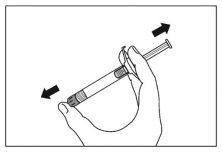
- Selecione a agulha adequada.
A primeira dose de início de Paliperidona Stada (150 mg) é administrada no Dia 1 no músculo DELTOIDES utilizando a agulha para a injeção no DELTOIDES. A segunda dose de início de Paliperidona Stada (100 mg) é administrada também no músculo DELTOIDES uma semana mais tarde (Dia 8) utilizando a agulha para a injeção no DELTOIDES.
Se ao paciente for trocado de risperidona injetável de ação prolongada para Paliperidona Stada, a primeira injeção de Paliperidona Stada (faixa de dose de 25 mg a 150 mg) pode ser administrada no músculo DELTOIDES ou no GLÚTEO, utilizando a agulha apropriada para o local da injeção, no momento da próxima injeção programada.
Posteriormente, as injeções de manutenção mensais podem ser administradas tanto no músculo DELTOIDES como no GLÚTEO utilizando a agulha adequada para o local da injeção.
No caso da injeção no DELTOIDES, se o paciente pesa < 90 kg, utilize a agulha do calibre 23de 1 polegada (25 mm x 0,6 mm) (agulha com eixo de cor azul); se o paciente pesa ≥ 90 kg, utilize a agulha do calibre 22de 1½ polegadas (38 mm x 0,7 mm) (agulha com eixo de cor gris).
No caso da injeção no GLÚTEO, utilize a agulha do calibre 22de 1½ polegadas (38 mm x 0,7 mm) (agulha com eixo de cor gris).
- Enquanto segura a seringa em posição vertical, retire o protetor de borracha da ponta com um suave movimento de giro.
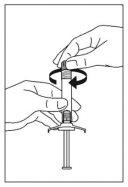
- Abra até a metade a bolsa do blíster da agulha de segurança. Segure a cobertura da agulha usando o plástico da bolsa. Adicione a agulha de segurança à conexão tipo luer da seringa com um suave movimento giratório no sentido dos ponteiros do relógio.
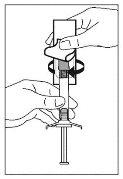
- Puxe a capa para separá-la da agulha seguindo uma linha reta. Não gire a capa, pois a agulha poderia soltar-se da seringa.
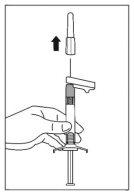
- Coloque a seringa com a agulha colocada em posição vertical para proceder à eliminação do ar. Elimine o ar da seringa empurrando o êmbolo cuidadosamente para a frente.
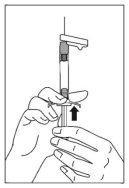
- Injete todo o conteúdo por via intramuscular lentamente, profundamente no músculo deltoides ou glúteo selecionado do paciente. Não se deve administrar por via intravascular ou subcutânea.
- Uma vez completada a injeção, utilize o polegar ou outro dedo da mão (8a, 8b) ou uma superfície plana (8c) para ativar o sistema de proteção da agulha. O sistema está completamente ativado quando se ouve um “click”. Descarte a seringa com a agulha de forma adequada.
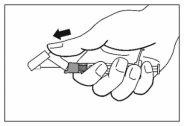
8a
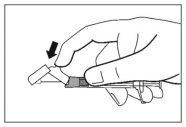
8b
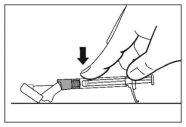
8c
A eliminação do medicamento não utilizado e de todos os materiais que tenham estado em contato com ele, será realizada de acordo com a normativa local.

Quanto custa o PALIPERIDONA STADA 100 mg SUSPENSÃO INJETÁVEL DE LIBERTAÇÃO PROLONGADA EM SERINGA PREENCHIDA em Espanha em 2026?
O preço médio do PALIPERIDONA STADA 100 mg SUSPENSÃO INJETÁVEL DE LIBERTAÇÃO PROLONGADA EM SERINGA PREENCHIDA em janeiro de 2026 é de cerca de 187.29 EUR. Os valores podem variar consoante a região, a farmácia e a necessidade de receita. Confirme sempre com uma farmácia local ou fonte online para obter informações atualizadas.
- País de registo
- Preço médio em farmácia187.29 EUR
- Substância ativa
- Requer receita médicaSim
- Fabricante
- Esta informação é apenas para referência e não constitui aconselhamento médico. Consulte sempre um médico antes de tomar qualquer medicamento. A Oladoctor não se responsabiliza por decisões médicas baseadas neste conteúdo.
- Alternativas a PALIPERIDONA STADA 100 mg SUSPENSÃO INJETÁVEL DE LIBERTAÇÃO PROLONGADA EM SERINGA PREENCHIDAForma farmacêutica: INJETÁVEL, 150 mg + 100 mgSubstância ativa: paliperidoneFabricante: Teva Pharma S.L.U.Requer receita médicaForma farmacêutica: INJETÁVEL, 50 mgSubstância ativa: paliperidoneFabricante: Teva Pharma S.L.U.Requer receita médicaForma farmacêutica: INJETÁVEL, 1000 mgSubstância ativa: paliperidoneFabricante: Janssen-Cilag International N.VRequer receita médica
Alternativas a PALIPERIDONA STADA 100 mg SUSPENSÃO INJETÁVEL DE LIBERTAÇÃO PROLONGADA EM SERINGA PREENCHIDA noutros países
As melhores alternativas com o mesmo princípio ativo e efeito terapêutico.
Alternativa a PALIPERIDONA STADA 100 mg SUSPENSÃO INJETÁVEL DE LIBERTAÇÃO PROLONGADA EM SERINGA PREENCHIDA em Polónia
Alternativa a PALIPERIDONA STADA 100 mg SUSPENSÃO INJETÁVEL DE LIBERTAÇÃO PROLONGADA EM SERINGA PREENCHIDA em Ukraine
Médicos online para PALIPERIDONA STADA 100 mg SUSPENSÃO INJETÁVEL DE LIBERTAÇÃO PROLONGADA EM SERINGA PREENCHIDA
Avaliação de posologia, efeitos secundários, interações, contraindicações e renovação da receita de PALIPERIDONA STADA 100 mg SUSPENSÃO INJETÁVEL DE LIBERTAÇÃO PROLONGADA EM SERINGA PREENCHIDA – sujeita a avaliação médica e regras locais.










